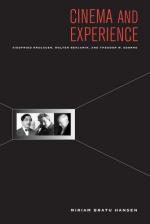|
This section contains 3,482 words (approx. 12 pages at 300 words per page) |

|
SOURCE: “Chapter 100: 1951,” in Yale Companion to Jewish Writing and Thought in German Culture 1096-1996, edited by Sander. L. Gilman and Jack Zipes, Yale University Press, 1997, pp. 691-96.
In the following essay, Olschner examines the relevance of Adorno's assertion that lyric poetry could not be written after the events of the Holocaust.
A tenaciously recurring leitmotif accompanying, at least implicitly, much West German discourse and criticism on lyric poetry after about 1960 has been the veritable possibility or impossibility of writing poetry after Auschwitz. Why lyric poetry should be singled out rather than, say, prose fiction or drama, has partially to do with the aporetic problem of representing the Shoah at all, but perhaps more with traditional German understanding of this particular genre. The question is fundamental, not merely academic; whether it is in fact relevant requires explication.
In 1949, the same year he returned to West Germany to teach temporarily...
|
This section contains 3,482 words (approx. 12 pages at 300 words per page) |

|


